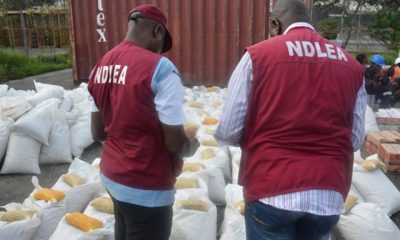Health
CPC Intercepts Truck With Fake Drugs Worth N50m in Kano

The Kano State Consumer Protection Council (KCPC) has intercepted a trailer loaded with fake and unregistered drugs worth N50 million.
The acting Managing Director of the Council, Dr Baffa Dan-Agundi, made the disclosure in a statement signed by the council spokesman, Mr Nabilisi Kofar-Na’isa, on Thursday, in Kano.
Dan-Agundi said that the operation was carried out following intelligence reports gathered by his men.
“The truck was intercepted on Feb.18, at about 3:30am at Filing Parking by Igbo Road, Sabon Gari. It was conveying drugs such as Coll Cap- unregistered, Solidrex- imitation, Basuka- imitation and chest and lung which was discovered to be unregistered,” he said.
Dan-Agundi said that the driver and owners of the dangerous drugs escaped by abandoning the vehicle and the content upon sighting the men of the council.
He enjoined those who were into the illegal business to know that there was a new Sheriff in town and as such, it was no longer business as usual.
Dan-Agundi disclosed that his office would do everything possible within the confines of the law to arrest and prosecute anyone guilty of supplying fake, expired and contraband drugs to the state.
He urged the general public to be more vigilant and join hands with the state government in the fight against drug abuse and unwholesome products which posed grievous danger to human health.
“My office is always open to receive credible information that will aid the activities of the council to check nefarious businesses of unscrupulous persons in the society, ” he said. (NAN)
Health
WHO Approves 2 New Vaccines to Protect Infants From RSV

The World Health Organization (WHO), on Friday, issued recommendations for two new immunisation tools to protect infants from Respiratory Syncytial Virus (RSV)They included a maternal vaccine, administered to pregnant women in their third trimester to protect their newborns.The other was a long-acting antibody injection for infants, which begins to protect within a week of administration and lasts for at least five months.
According to WHO, RSV is the leading cause of acute lower respiratory infections in children globally. It causes around 100,000 deaths and 3.6 million hospitalisations each year among children under the age of five, while infants under six months are most at risk.Alarmingly, 97 per cent of these deaths occur in low and middle-income countries, according to WHO.Although RSV can infect people of all ages, “it is especially harmful to infants, particularly those born prematurely,” a WHO official, Kate O’Brien, said.O’Brien added that around half of all RSV-related deaths occurred in babies younger than six months.Considering the global burden of severe RSV illness in infants, WHO recommended that all countries adopt either the maternal vaccine or the antibody injection as part of their national immunisation strategies.“These RSV immunisation products can transform the fight against severe RSV disease, dramatically reduce hospitalisations and deaths, and ultimately save many infant lives worldwide,” O’Brien said. (NAN)Health
UNICEF Promotes Menstrual Hygiene for Girls

The United Nations Children’s Fund (UNICEF) has encouraged girls to embrace menstruation with pride and confidence, recognizing themselves as vital contributors to humanity’s sustainability.
Mrs Aderonke Akinwole, Social and Behavioural Change Specialist at UNICEF, gave the advice during an event on Wednesday organised with the Nigeria Girls’ Guild and Lagos State Primary Health Care Board.
The event was held to commemorate Menstrual Hygiene Day (MHDay) and was attended by students from both public and private schools across Lagos.
With the theme ‘Together for a Period Friendly World,’ the event aimed to raise awareness and promote dignity in menstrual hygiene.
“When a girl begins menstruation, it should be celebrated. It signifies her transition into womanhood and her ability to sustain life.
“They should be proud, and seek accurate, helpful information to remain safe, clean, and healthy during their period,” Akinwole said.
She emphasised that girls must not feel ashamed, as menstruation is a natural part of womanhood and a symbol of female dignity.
She urged the state government to increase sensitisation efforts and include menstrual hygiene education in school curricula, religious settings, and community platforms.
Akinwole also warned against stigmatisation, especially from boys, and called for boys to be educated to respect menstruation as part of girls’ lives.
“Girls should understand the menstrual cycle even before it starts. This should be part of health education in schools, churches, mosques, and communities,” she said.
She explained that girls need awareness on menstrual hygiene management and should know how to prepare for their periods in a healthy, informed way.
Mrs Honfor Adesola, Director of Education at Lagos State Primary Education Board, commended UNICEF’s support in promoting menstrual hygiene and addressing issues affecting girls.
Adesola highlighted that maintaining menstrual hygiene is vital in preventing infections and ensuring comfort throughout the menstrual cycle.
She noted that the event also helped to raise awareness about the Human Papillomavirus (HPV) vaccine available free in health centres across Lagos.
“We’re here to mark MHDay and to engage girls on HPV awareness. The state government has provided the vaccine, and sensitisation must continue,” she explained.
She encouraged girls to discuss the HPV vaccine with their parents to gain consent, ensuring protection against cervical cancer.
“The vaccine is safe, effective, and accessible in state facilities for girls aged nine to fourteen, but many have not yet been vaccinated,” she added.
Meanwhile, Ethagah Divine, Head Girl of New Estate Baptist Secondary School, Surulere, called on NGOs to provide sanitary pads for girls.
She urged more campaigns and rallies to distribute free menstrual products, like UNICEF did, to promote hygiene and dignity during menstruation.
Miss Emmanuella Azubuike, a student of the same school, expressed gratitude to UNICEF and partners for the impactful menstrual hygiene awareness event.
“This programme has expanded my knowledge on menstrual hygiene and HPV. More NGOs should support these campaigns to reach and educate more young girls,” she said. (NAN)
Health
Soludo’s Wife Establishes Pad Banks in 300 schools

Wife of Anambra State Governor, Dr Nonye Soludo, says she has established pad banks in 300 schools across the state as part of her pet project, Healthy Living Initiative.
Mrs Soludo disclosed this in a message in Awka on Wednesday to mark the 2025 World Menstrual Hygiene Day.
She said that the initiative was her own approach to helping school girls whose academic focus could be affected during menstruation and related emergencies.
Mrs Soludo stressed the need to provide immediate solutions for menstrual emergencies in schools, so that girls caught off guard could confidently rely on the pad banks.
“Official data say that an estimated 37 million women and girls in Nigeria are unable to afford sanitary pads and only rely on unhygienic alternatives.
“The data reinforce World Health Organisation and United Nations Children’s Fund finding that poor water, sanitation and hygiene infrastructure hinders safe and dignified menstruation for women and girls.
“Other data say that only two in five schools globally offer menstrual health education and just one in three have bins for menstrual waste.
“These figures challenge key stakeholders to find practical solutions to address the root of the problem while the situation remains reversible.”
She called for intensified campaign to reach more women and girls currently facing menstrual hygiene challenges.
The governor’s wife noted that the growing number of women, especially girls, in urgent need of menstrual support makes it essential for stakeholders to re-strategise their campaign approach.
According to her, menstrual health remains the right of every girl-child.
She encouraged girls at the designated schools participating in the pad bank project to use the supplies with confidence.
Mrs Soludo assured them that her NGO was fully committed to restocking any of the pad banks that run out of sanitary products.(NAN)



























